CAIRO—It takes about 30 minutes to drive from the teeming Cairo neighborhood of Faisal to what locals call “El Sijn”—Arabic for “the prison.” There are many in Egypt, but everyone seems to know the prison: Tora Prison, opened in 1908. It has housed a diverse assortment of the country’s dissidents, businessmen, Islamists, and statesmen—including the ousted president Hosni Mubarak, who had ruled Egypt for nearly three decades before his regime fell in the uprising that began almost exactly five years ago.
Since then, the upheaval hasn’t stopped, and it’s as much personal as it is collective. The country saw its first-ever democratic elections; another wave of protest over the rule of Mohammed Morsi, the Islamist president those elections brought to power; a military coup, led by then-Army Chief Abdel Fattah el-Sisi; and a reinstatement, under now-President Sisi, of the kind of authoritarianism protesters risked their lives to escape five years ago. The crackdown has ensnared liberals and Islamists alike, leaving the prison as a burial chamber for the aspirations of the revolution, in all their wide variety.
“It’s been five years since we’ve toppled Mubarak and we’re back to square one,” Nourhan says. At 26, Ahmed was one of Egypt’s most prominent liberal activists, and remains a living symbol of the revolution: once vibrant and triumphant on Cairo’s streets, now languid and silenced behind bars. The young couple used to talk for hours about their plans to open a bookstore, maybe even start a publishing house dedicated to fostering freedom and democracy in a country with a severe deficit of both. Now their conversations are limited to a hurried, supervised 20 minutes every other week.
Amnesty International and other human-rights groups have called Sisi’s crackdown unprecedented. Security forces have targeted Morsi’s supporters and accused the Brotherhood of coordinating with far more radical Islamist groups that have killed hundreds of police and soldiers in the Sinai Peninsula, including one that pledged allegiance to the Islamic State in 2014. The Brotherhood denies any affiliation. Egypt’s Ministry of Interior has reported that 11,877 people were arrested on terrorism charges between January and September 2015, though it has released no updated numbers since.
But the state’s tentacles have spread to strangle any dissent. A protest law passed in November 2013 has become, as Amnesty International describes it, “a fast track” to prison. According to the most recent data available from the Egyptian Center for Economic and Social Rights, since Morsi’s ouster 41,000 people had been arrested, charged, or indicted with a criminal offence as of May 2014.
“If you’re not with the military regime, you’re a terrorist. But once you lift the terrorist title you see people you know … your son, your husband, the grocer down the street … everyone,” Fathia says. “The country is divided. … No one knows what is next.”
The repression has been intensifying ahead of the fifth anniversary of the revolt’s beginning on January 25; security forces have recently arrested activists and shut down cultural spaces, including a popular art gallery—one of the few bastions of creative community—in downtown Cairo.
“We are now facing the worst, most oppressive time in modern Egyptian history,” says Gamal Eid, a leading Egyptian human-rights lawyer and activist. “[T]he freedom of those behind bars is our own freedom.”
Five years after Egypt’s popular uprising began and briefly triumphed, here are the stories of five families from across Egypt’s scarred political spectrum, united by their grief over a revolution that devoured its children. Their stories form a tattered scrapbook of one of the most tumultuous periods in the region’s modern history.
***
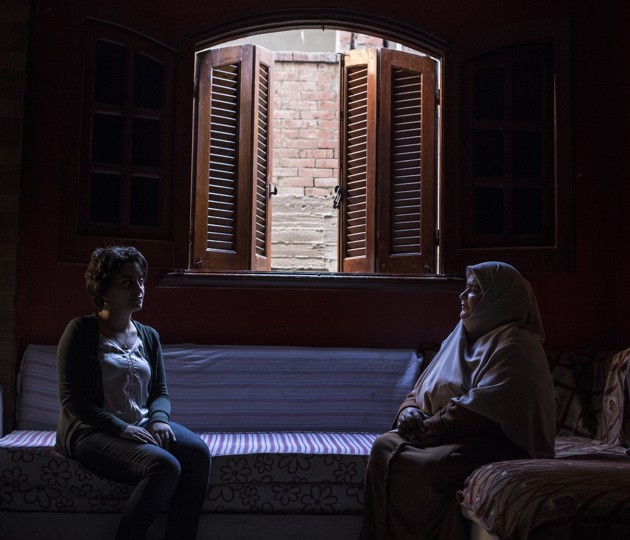
Prisoner: Ahmed Douma
Nourhan Hefzy (wife) and Fathia Douma (mother)
It took awhile for Fathia to warm up to Nourhan, the wife of her oldest son. For one thing, she’s unveiled. Fathia, who has lived in a conservative Nile Delta village her whole life, says she was worried what other people would say. “In our family we would consider a man who lets his woman dress like this as not in control of his house,” she explains.
Nourhan is also a self-described liberal activist who, despite growing up in a conservative Cairo neighborhood, was allowed to have boys as friends and pursue drama in school. Fathia comes from a family of staunch Muslim Brotherhood supporters in the countryside. In communities like theirs, long neglected by Mubarak’s regime, the Muslim Brotherhood provided a range of social services such as health clinics and nursery schools. Fathia’s family benefitted from and strengthened that network; they built their neighborhood’s first mosque and volunteered weekly. For Fathia and her husband, the organization “signifies what it means to be a Muslim. It’s about caring for all.” Nourhan rolls her eyes at this.
Fathia notes generational differences—“this generation wants to live their life, in their own style”— but there’s more to the family’s dispute. Ahmed, she says, has always questioned authority. In February 2015, he was sentenced to life in prison as part of Sisi’s crackdown. But by then he was no stranger to prison. He had been jailed under Mubarak and then Morsi as well. He was first arrested in 2009 at the border of the Gaza Strip along with other activists expressing solidarity with Palestinians.
Ahmed was again arrested in 2012, this time for, among other things, spraying anti-Morsi graffiti around the Muslim Brotherhood headquarters, and again released fairly soon. But his father, a Brotherhood supporter, publicly agreed with Ahmed’s punishment. “This caused a chasm between us and Ahmed,” Fathia recalls. “Nourhan started to feel that she and Ahmed belong to one team, and that we belong to different team.”
On June 30, 2013, Ahmed was among millions who demonstrated for Morsi to step down and hold early elections. On July 3, he cheered along with much of the country when the military ousted him. His father told him then that the country’s youth were being foolish, that the “deep state”—the entrenched centers of authority among Egyptian bureaucrats and security forces—would prevail. More than two years later, many think he was right. Ahmed is again behind bars. His father keeps a low profile in his Nile Delta village, fearful of being abducted or arrested at any time, like so many of his relatives and friends.
Fathia doesn’t retort. Instead, she recalls the recent wedding of her younger son, who wanted to wait until Ahmed got out of prison to get married. When Ahmed was handed a life sentence, he decided not to wait any longer.
“I was so distracted by Ahmed’s absence at the wedding that I couldn’t even notice my other son who was getting married,” says Fathia, her face folding into tears.
Nourhan reaches over to touch her arm. “It’ll be okay, mother,” she says. “It’ll be okay.”
She hands Fathia a tissue, but not before using it to wipe her own tears.
***
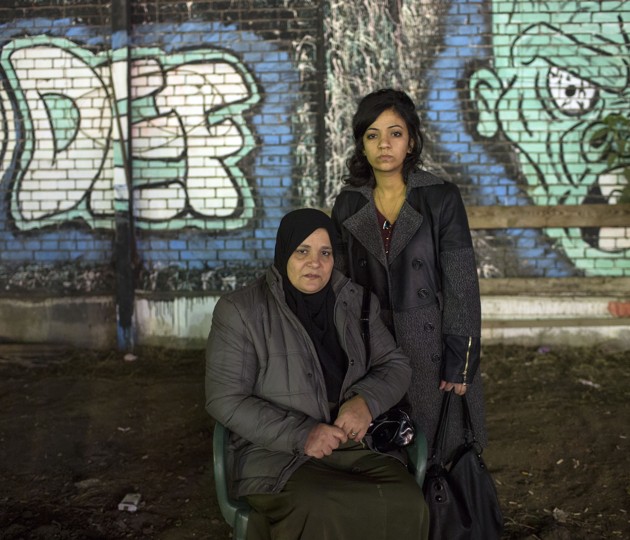
Prisoner: Esraa el-Taweel
Hana (mother), Doaa (sister)
Esraa el-Taweel returns to her cramped Cairo apartment for the first time after six months in prison. It’s largely as she left it, filled with the traces of a normal 23-year-old life turned upside down in just one evening.
There’s her beloved cat, Woody, who had kittens while she was gone. There’s the treadmill she used for physical therapy after she was shot by a police officer (and nearly paralyzed) in 2014, during third-anniversary celebrations for the January 25 Revolution. Then there’s what her 22-year-old sister, Doaa, calls her “heart”: two Canon cameras, which she has used to document the past five years.
Esraa was accused of belonging to the now-banned Muslim Brotherhood and of publishing false reports that “distort Egypt’s reputation”—charges she denies. In December, the Cairo Criminal Court released her for medical reasons, but the charges remain, and her movements are still restricted and monitored. She’s not allowed to talk to the press.
“El kaboos,” as Esraa’s sister and mother call it—Egyptian Arabic for “the nightmare”—began one humid evening last June. Esraa and two of her best friends, Omar Mohammed and Suhaib Saad, went to Chili’s, the Cairo outpost of the American restaurant chain, and never made it back home.
“The days were long and we all had nightmares. Is she alive? Did someone kill her?” recalled Doaa. “We waited 17 days until we found out she was detained.”
She and her friends had been seized by plain-clothes police officers outside the restaurant, but Egyptian security forces repeatedly told Esraa’s family and their lawyers that they weren’t holding her. Hana said some even scolded her for letting her daughter go out with two male friends, and suggested that Esraa had run off with a lover.
It wasn’t until Esraa’s father went on television to talk about his missing girl that someone gave the family a tip through Facebook: A woman said she had seen Esraa at a prison for women in Cairo. Like many Egyptian young people, Esraa had protested against Sisi’s human-rights abuses and tweeted criticisms of his rule, Doaa says—nothing that warranted detainment. “If a nearly crippled girl is a threat, then it can be any of us.”
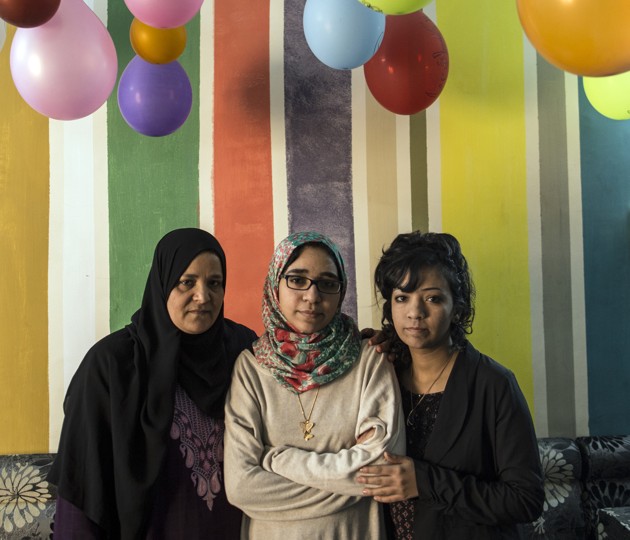
Over the course of her imprisonment, Esraa’s ability to walk deteriorated. Doaa rarely smiles and can barely muster the interest to finish her last year of university. Their younger sister, Alaa, has dropped out of school. Their mother says she can’t bring herself to scold her. Why plan for a future in a country where a night at Chili’s can usher in months of sorrow?
Last summer, Hana said that as soon as Esraa got out of prison, the family would pack their bags and leave the country. But now that Esraa is out, there’s no way to leave. They must wait. Until the verdict comes in or until the charges are dropped or until … they don’t know what.
Until then, celebratory balloons hang from the ceiling of Esraa’s apartment. Her two cameras still sit in her bedroom, layered with a thick coat of dust even though she’s back home.
* * *

Prisoner: Mohammed Emam
Saleh Taher (mother)
“We’re not a politically interested family,” she explains as we sit in her living room with her husband and oldest son. “We don’t like politics.”
But now they’re tangled in and strangled by it.
In January 2014, Saleh’s 21-year-old son Mohammed Emam was shot in the leg during a demonstration at the University of Alexandria. That April, he was arrested following a protest at the university.
While his mother denies that her son is an activist, his friends say Mohammed is part of the April 6 Youth Movement—a group that helped organize the mass protests that toppled Mubarak in February 2011. In April 2014, a court banned the movement, accusing it of “espionage” and “activities that distort Egypt’s image.” One pro-government lawyer accused the group of being a “terrorism organization.”
“We don’t even know what April 6 is,” Saleh says. She often mistakes the name and confuses the group’s prominent leaders—evidence, she says, of her family’s ignorance and her son’s innocence.
Nothing is wrong in Egypt, she says. They’re just a normal family, she says. They just go about their business, she says. “We’re only concerned about the health of our son.”
Mohammed’s imprisonment is complicated for the family. His father is a retired military officer. “We’re not allowed to get involved in politics,” is all he’ll say.
From the opposite end of the room, the father clicks his tongue in disapproval.
Saleh laughs nervously, tightening her pink headscarf. “That’s his business,” his father says when asked about Tamer’s opinion. He has yet to visit his son in prison. “Me, I don’t have any opinions about all this.”
* * *
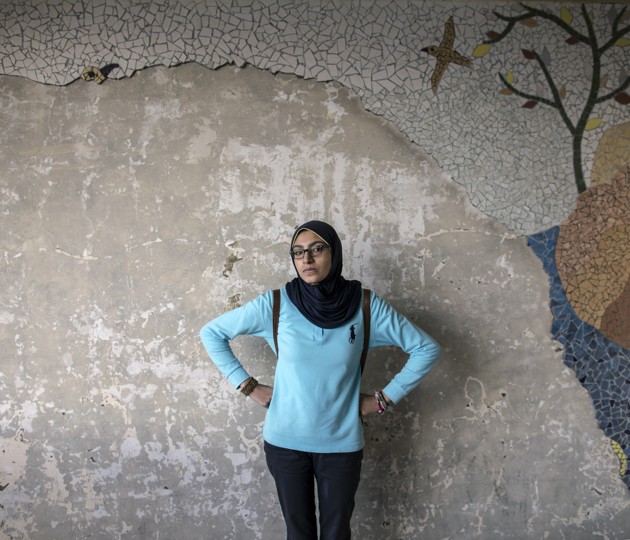
Prisoner: Loay el-Khawagy
Mai el-Khawagy (sister)
Mai says she has aged 50 years in the past five. When the revolution started, the aspiring violinist was only 15. She didn’t know what was happening or what was at stake. She had grown up in Alexandria and had never been to Cairo. She still hasn’t. But now at 20, she says she has seen it all.
“I’m not a child anymore,” she declares, sitting in a café on Alexandria’s glistening Mediterranean coastline. “No one is a child anymore.”
Along with her childhood, she has lost friends over political differences. She has lost others through death. She witnessed the killings of two friends, who were met with live ammunition at her university where they were protesting for more rights.
“Loay says the situation is so bad now in Egypt that being in prison is actually better, because if he were out, he would do something reckless or radical,” she says. “He would keep protesting and never go back until he’s dead.”
In February 2015, Loay and others were sentenced to two years in prison, for charges including protesting without authorization and threatening public security. After an appeal, the verdict was reduced in May to one year and three months. Loay was already in prison, serving time in another case of protesting without permission outside the Alexandria Criminal Court in December 2013, while it was retrying two police officers accused of killing 18-year-old Khaled Said. Said died in June 2010 after being beaten by police officers. His death is considered a major catalyst for the 2011 revolution.
Mai, a relatively conservative, veiled university student who shuns political labels, was never very close to her older brother, who would read Marx instead of the Quran, smoke cigarettes, and hang out with his “comrades,” including unveiled girls. Loay considers himself a revolutionary socialist—his Twitter bio reads, “In gloom, we bloom”—and he was an outsider in an otherwise conservative family. One of their cousins is a member of the Muslim Brotherhood and is currently in prison.
“In the past, before all this, I would have never talked to people like him or people different than me,” she says. “This experience completely changed me, and though my world is still small, it’s bigger.”
It’s something she says Loay had been trying to instill in her since she was a child.
“When I was a kid, I used to hate cockroaches. Whenever I saw one in the house, I’d scream and immediately try to kill it,” she recalls. “But Loay would take it and put it outside, instructing me to do the same.”
“‘Just because you hate it, doesn’t give you the right to kill it,’ he’d say. ‘Just because you hate it, doesn’t mean you can’t live with it.’”
* * *
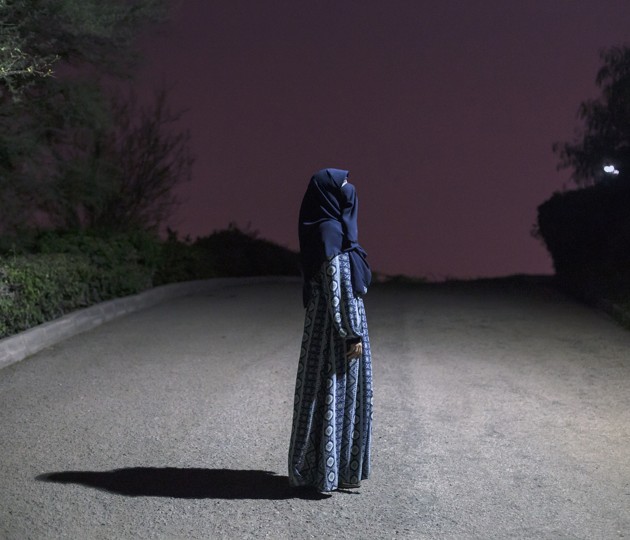
Prisoner: Mohammed el-Beheit
Rawda (daughter)
For the past six months, whenever Rawda has wanted to see or talk to her father, she must wait for a call from an unknown number. She then travels from her Nile Delta village to a clandestine location around Cairo, where he changes his residence once every few weeks.
“He had opportunities to flee the country and be free,” the 20-year-old law student says. “But if everyone fled, who would stay and fight? Who would stay and continue the struggle? When you believe in a just cause, it gives you strength to go on.”
Her father had been a leading Muslim Brotherhood figure since she was young. Under Mubarak, he had been arrested for his involvement in the group in 2005, 2007, and 2010, but never for longer than 15 days. This was the norm for many of her friends’ fathers. “The Brotherhood isn’t just an organization,” she explains. “It’s a way of life.”
Growing up, Rawda says the organization was all she knew, but she didn’t strongly identify with it. And during Morsi’s rule, she even criticized them for taking too much control.
But in 2013, her lukewarm allegiance boiled to impassioned dedication when security forces killed up to 1,000 supporters of the ousted Islamist president in Midan Rabaa al-Adawiyya, a public square in eastern Cairo, who had been occupying the square for 47 days. Human Rights Watch has described the event as “one of the world’s largest killings of demonstrators in a single day in recent history.”
“There’s been a blood ghost following me ever since,” she says, barely able to finish her sentence. “I can’t shake the sights of that day.” She has been in therapy for the past few years but still suffers from panic attacks whenever she is near the square.
While Rawda says the Muslim Brotherhood has moved back underground, they’re as committed as ever. They hold their weekly meetings in secret locations and have appointed a new local leadership. Still, everyone knows she is associated with the group, and she fears she could be expelled from her university at any time. Every two weeks she and her friends hold small demonstrations there, but they feel powerless to effect any real change.
“In some ways, everything but nothing has changed,” she says. Nine months ago, she decided to wear the niqab, a veil that covers the face. Her father advised her not to—for fear of rising national sentiment against Islamists—but she insisted.
“It’s my way of saying I’m going to be who I want to be,” she says. “It’s my choice. It’s my right.” She also expresses herself on Facebook, posting a torrent of pleas for people to remember the jailed and detained, for the country to “wake up.” Recently, she posted an image of a ballerina’s feet, the left one wrapped in an elegant slipper, the right one bare but for bandages, bruises, and sores. It’s a reminder, Rawda says, of the beauty that masks pain, of the pain that creates beauty.
She now wants to be a human-rights lawyer and has started working with the London-based Arab Organization for Human Rights. She documents arrests and contacts families of detainees.
“When Mubarak stepped down, it was a beautiful memory,” she says, recalling protesting in Tahrir Square alongside her father. “Now, all we have are the memories.”
Lauren Bohn is The GroundTruth Project’s Middle East correspondent based in Istanbul and co-founder of Foreign Policy Interrupted.
 A version of this story also appeared in the The Atlantic on January 23, 2016
A version of this story also appeared in the The Atlantic on January 23, 2016
































